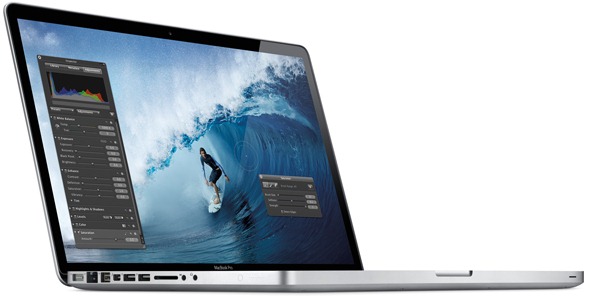Amid all the talk of the iPad 3, Digitimes has remembered that Apple does indeed release other products besides the now hotly-anticipated third tablet installment – set to be launched on March 7th.
Although nothing is set in stone (such reports seldom are), the Cupertino outfit could be launching a couple of revamped, thinner MacBook Pros, allied perhaps with a new, 14-inch MacBook Air.
The premium of Apple’s notebooks, the Pro has continued to sell in strong numbers despite the Air bringing an unprecedented sleekness which has won over many Mac users, as well as manufacturers of Windows laptops – many of whom have tried to emulate the paper-thin form factor with Ultrabooks.

Although the MacBook Pro has always been the powerhouse, that doesn’t mean Apple is content with retailing something which – by its own very high, very thin, and very lightweight standards – is a tidbit larger than life.
Although the new MacBook Pros are expected to be sleeker than the current models, don’t expect anything in the league of the Air. After all, the specs simply won’t pack in to such a slender shell. The new MacBook Pro models could be released as soon as April, although details remain sketchy.
The report only concerns the 13-inch and 15-inch models, with no word on the fate of the 17-inch MacBook Pro. The possibility has been offered that Apple will follow a similar release pattern to the unibody MacBook Pro in late 2008 and early 2009.
Initial shipments are said to be in the 900,000 region, but with the release of the iPad 3 expected in the month prior to the purported release, one suspects those partial to an apple-logo bearing gadget will be sufficiently occupied.

Intel has yet to categorically address the timescale for quad-core mobile processors like the ones found in the current 15-inch and 17-inch MacBook Pro, although MacRumors‘ Eric Slivka reckons Apple may slip a quad-core Ivy Bridge chip into the 13-inch MacBook Pro since Intel is releasing a chip with a lower, more manageable thermal design requirement for the smaller frame.
Even if Intel doesn’t get its act together with the Ivy Bridge chips, Tim Cook’s company tends to draw favoritism, which may see Apple get first dibs on the first wave of the new chips.
You may also like to check out:
You can follow us on Twitter, add us to your circle on Google+ or like our Facebook page to keep yourself updated on all the latest from Microsoft, Google, Apple and the web.

